
Arthur Rothstein Rear of interstate truck. Elko, Nevada 1940

Going down down down.
• Debt On Track To Destroy The American Middle Class (GoldT)
Economists report the household debt to be at its highest in decades. Yet, at the same time, we are being told that the economy is doing great. Does anyone see a serious contradiction? In fact, the current economy only favors the wealthy owing to their flourishing financial assets such as stocks and bonds. Owing to the lack of real assets such as property and commodities, the middle and lower classes are becoming overwhelmed due to the serious consequences of the spending/debt cycle. American consumers have a collective outstanding household debt of about $13.15 trillion of which nearly $1 trillion is the credit card debt alone, households are truly on a debt binge. These figures should be a wake-up call to all the Americans. The convulsive household debt has surpassed the bubble of 2008 and is still escalating. The economy may not be doing so great, after all.
Compared to 2008, the automobile credit balances have increased to $367 billion whereas the outstanding student loans are around $671 billion. Moreover, 67% of household debts belong to consumer mortgages. In 2016, 25% of all the Americans purchased a new or used vehicle and two-thirds of them are repaying through high-interest, long-term loans. In fact, the consumer debt has exceeded their income for majority of the Americans. Consumers have become accustomed using easy credit to maintain a lifestyle unaffordable for them otherwise. If this trend continues, and facts indicate that it will, we will be facing a monumental credit crisis in the near future. A huge portion of credit card debt is the interest. Credit cards are a convenience and consumers readily pay for the privilege.
[..] The decline in automobile sales is already an indication of the future consumer debt crisis. If lenders continue to provide easy access to credit regardless of its looming default and delinquent potential, retail purchase will face a sharp decline in 2018. This will have serious consequences on the overall economy. The Federal Reserve and other global lenders are a significant contribution to the problem. They allow printing of trillions of dollars and yens for the lenders to distribute to the borrowing consumers at a high interest, leading to a worldwide inflation. All this printed wealth is merely an illusion yet it is raising the cost of living. Prices are rising at an alamingly faster rate compared to the consumer income. There is no increase in real assets. All this is but a mere mushrooming of debt.
The consequences of federal policy will be inescapable unless reversed and there are no signs of any reversal in near or distant future. At this rate, the consumers will soon face a critical financial bubble. Financial assets, such as stocks and bonds, risk losing substantial value. The wealthy can absorb the losses but the poor and middle class will face financial ruin. Consumers need to seriously consider the need to increase their “real” assets, such as real estate and commodities to prevent a long-term financial nightmare. The chart below shows how the real assets have curved to an all-time low.
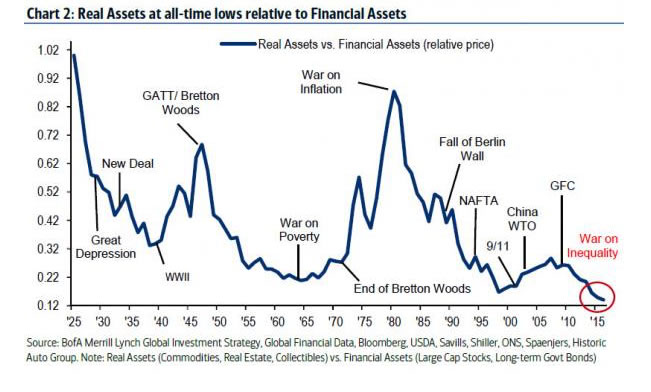

Gee, what a surprise.
• The Only Thing That Can Save Stocks Is QE (ZH)
In the last 45 years, there have been seven periods of persistent US dollar and Treasury bond weakness and as BofAML notes, during six of those periods, stocks have been pressured significantly lower.
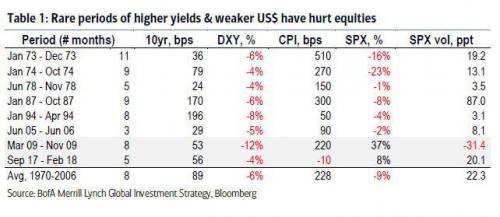
This could be a problem, as it’s happening again… and stocks are beginning to wake up to it…
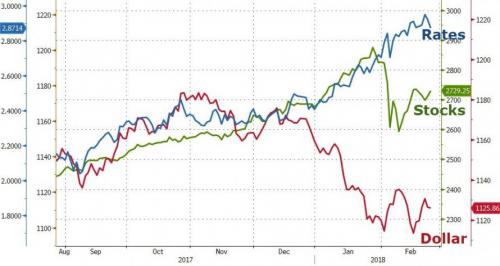
There has only been one period in history when falling dollar and bond prices did not lead to slumping stocks…And that was when QE was expanded drastically in March 2009.
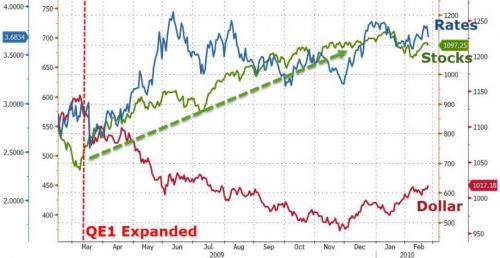

Tightening and then not.
• Fed ‘Quite Likely’ To Require Large-Scale QE Again (ZH)
Ahead of Fed Chair Powell’s first semi-annual monetary policy report to Congress next week (brought forward to 2/27), The Fed has released his prepared remarks warning that “valuations are still elevated across a range of asset classes” and fears “signs of rising non-financial leverage.” To wit: Looking at the key topic of inflation, and the labor market, the Fed found that U.S. labor market is “near or a little beyond” full employment in early 2018, and that while the pace of wage growth has been modest, “serious labor shortages” would probably give it an upward push. Ironically, and paradoxically for an “economy beyond full employment”, the Fed observes that “the pace of wage gains has been moderate; while wage gains have likely been held down by the sluggish pace of productivity growth in recent years.”
Regardless, the Fed clearly is concerned about labor supply-demand imbalances, and has even added a new word: serious, as in “serious labor shortages would probably bring about larger increases than have been observed thus far.” In a separate special section on financial stability, the Fed notes that overall vulnerabilities in the U.S. financial system remain moderate, while noting some spots where things are warming up. These include signs of increased leverage to the nonbank sector, noting greater provision of margin credit to equity investors such as hedge funds. Looking at financial imbalances, the Fed warns that “leverage in the nonfinancial business sector has remained high, and net issuance of risky debt has climbed in recent months. In contrast, leverage in the household sector has remained at a relatively low level, and household debt in recent years has expanded only about in line with nominal income.”
[..] Curiously, before Powell’s remarks were dropped, both Dudley and Rosengren were on the tape this morning talking super dovish about QE as “useful to have in the toolkit for those times when the short-term interest rate tool may not be available,” adding that The Fed is “quite likely” to require large-scale asset purchases again because real rates will remain low due to slow productivity and labor-force growth.

Horse has left that barn ages ago.
• VIX Funds Face Fresh Scrutiny From US Regulators (BBG)
U.S. regulators are scrutinizing this month’s implosion of investments that track stock-market turmoil, including whether wrongdoing contributed to steep losses for VIX exchange-traded products offered by Credit Suisse and other firms, several people familiar with the matter said. The Securities and Exchange Commission and the Commodity Futures Trading Commission have been conducting a broad review of trading since Feb. 5, when volatility spiked and investors lost billions of dollars, the people said. Among those looking into what happened are lawyers in the SEC’s enforcement division, which investigates firms for potential misconduct and fines them if it finds violations of securities laws, two of the people said. There is no indication thus far that specific companies, including Credit Suisse, are being probed.
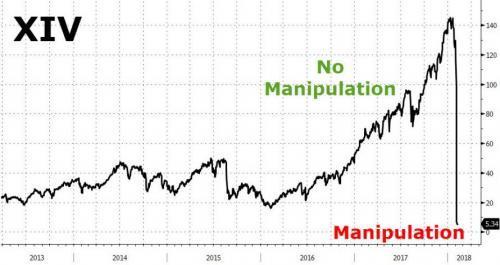
The scrutiny puts a spotlight on a small corner of the $3.4 trillion exchange-traded fund industry that lets everyone from hedge funds to mom-and-pop investors engage in complex trading strategies. With losses now piling up, allegations of market manipulation are getting more attention and government watchdogs face questions about why small-time investors were permitted to buy such products in the first place. “The values of these exchange-traded products are based on a combination of futures, options and three indices. Quite the maze,” Democratic SEC Commissioner Kara Stein said Friday in a speech at a conference in Washington. “What troubles me is that oftentimes complex products fall into the hands of people who don’t fully understand them.”
SEC Chairman Jay Clayton told reporters at the same event Friday that he wasn’t concerned about how the market functioned during the steep decline in equities on Feb. 5 and in the two weeks since. He said it would be appropriate, however, to review which types of more complex investments are widely available to average investors. “The portfolio of products available to retail investors has changed dramatically and it’s worth taking a look at,” Clayton said.

Tough job. Xi sets rates all by himself.
• Xi Confidant Emerges As Front Runner To Head China’s Central Bank (R.)
Liu He, a Harvard-trained economist who is a trusted confidant of Chinese President Xi Jinping, has emerged as the front runner to be the next governor of the People’s Bank of China (PBOC), according to three sources with knowledge of the situation. Liu may be in a position to become one of China’s most powerful economic and financial officials ever, as he is already top adviser to Xi on economic policy and is also expected to become vice premier overseeing the economy. Liu would replace current PBOC chief, 70-year-old Zhou Xiaochuan, who is China’s longest-running head of the central bank, having taken the job in 2002. Zhou is expected to retire around the time of the annual session of parliament in March, sources previously told Reuters.
The change would be part of a wider government reshuffle following the 19th Communist Party Congress in October last year, during which Xi laid out his vision for China’s long-term development, and elevated his key allies. Speculation has been rife for months over the choice of the next central bank governor. Xi will have the final say, and the sources noted that while Liu is clearly the frontrunner he is not yet certain to get the job. Just before last October’s Congress, sources told Reuters that China’s banking regulator head Guo Shuqing and veteran banker Jiang Chaoliang were leading contenders for the PBOC job. But at the congress, the influence of the 66-year-old Liu continued to grow. He was elected into the 25-member Politburo, the second-highest tier in Beijing’s political power structure after the seven-member Politburo Standing Committee.
Sources previously told Reuters that Liu, a fluent English speaker, is set to become one of China’s four vice premiers and would oversee the economy and financial sector. Two of the sources said that Liu could serve concurrently as vice premier and head of the central bank.

Brexit is not all bad.
• Brexit To End London House Price Boom (Ind.)
UK inflation will outstrip gains in house prices this year and next, particularly in the capital, as uncertainty over Brexit and weak consumer spending power hits demand, a Reuters poll found on Friday. According to the latest quarterly Reuters poll of 33 housing market specialists, taken in the past week, property prices will rise 2.0% this year, much slower than the predicted 2.5% rise in general costs in the economy. In London – long the hotbed for foreign investors behind a decade of skyrocketing prices – the difference will be even starker: the average price is expected to fall 0.5% this year. Next year, house prices will rise 0.9% in London and 2.0 nationally, still both below the 2.1% expected inflation rate. In 2020, London prices will increase 2.0% and by 2.3% nationally. “A significant effect of Brexit is subdued investment confidence,” said Rod Lockhart at online mortgage lender LendInvest.
“Would-be sellers are holding onto assets for longer and buyers are being a little more diligent before committing to significant expenditures, all this against a backdrop of inflation-surpassing wage growth.” Most respondents in the poll said the Brexit vote had been negative for both turnover and prices in London but were split over whether it had been negative or had no impact nationally. Sterling is over 6% weaker than before the June 2016 vote to leave the EU, something that should make properties more attractive to foreign investors, who can take advantage of cheaper prices. But uncertainty over how Brexit divorce talks will pan out has deterred overseas buyers. “Foreigners get more pounds in their pockets, but the nation and its capital has lost some of its allure,” said Tony Williams at property consultancy Building Value.

May the masochist.
• UK Post-Brexit Plans Based On A “Pure Illusion”- EU (G.)
Theresa May’s reported agreement with her cabinet on a future trading relationship with the EU has been criticised as based on “pure illusion” by the European council president, Donald Tusk, as frustration with the UK erupted in Brussels. Reports that May’s inner cabinet had agreed on a policy of “managed divergence” during eight hours of talks at an awayday in Chequers were met with incredulity by EU leaders. Tusk told reporters on Friday: “I am glad the UK government seems to be moving towards a more detailed position. “However, if the media reports are correct, I am afraid the UK position today is based on pure illusion. It looks like the cake [and eat it] philosophy is still alive. “From the very start it has been a set principle of the EU27 that there cannot be any cherrypicking of single market à la carte. This will continue to be a key principle, I have no doubt.”
Speaking at a summit of EU27 member states in Brussels, to discuss the EU’s budget and leadership post-Brexit, Leo Varadkar, the Irish taoiseach, also insisted that the single market was “not à la carte”. It is believed the British government is seeking to maintain frictionless trade in some sectors by staying in lock-step alignment with EU regulation, while opening up the prospect of diverging in other areas in order to gain a competitive advantage in the international marketplace. “It is not possible for UK to be aligned to EU when it suits and not when it doesn’t,” Varadkar said. “The UK position needs to be backed up with real detail that can be written into a legal treaty with the EU. We are well beyond the point of aspirations and principle. We need detail.”

Britain should be taken to The Hague for its involvement.
• Ecuador Blames UK As Assange Talks Break Down (G.)
Talks between the UK and Ecuador over the future of Julian Assange at its London embassy have broken down, the South American country’s foreign minister has said. Maria Fernanda Espinosa suggested British officials had been unwilling to negotiate over the Wikileaks founder’s potential release. Earlier this month, a judge upheld an arrest warrant issued when Assange skipped bail as he fought extradition to Sweden in 2012. The 46-year-old has been at the embassy ever since because he fears extradition to the United States for questioning over the activities of WikiLeaks if he leaves. Espinosa said of the failed talks: “To mediate you need two parties, Ecuador is willing, but not necessarily the other party.”
Ecuador said it would continue to protect Assange’s rights, however there was a risk to his physical and psychological wellbeing after spending nearly six years in the building as a “refugee”. The country has assessed more than 30 similar cases in a bid to break the deadlock, including that of British-Iranian citizen Nazanin Zaghari-Ratcliffe, who is in prison in Iran accused of spying. This included options for granting diplomatic immunity, although Ecuador said it would continue to respect the UK’s laws. In November, Espinosa said Assange had been granted Ecuadorian citizenship. The foreign minister said Ecuador was trying to make Assange a member of its diplomatic team, which would grant him additional rights under the Vienna Convention on Diplomatic Relations – including special legal immunity and safe passage.

All because of North Korea?!
• Europe to Wind Down Latvian Bank Targeted by U.S. Over Sanctions (BBG)
European authorities moved to liquidate Latvia’s ABLV Bank after clients pulled assets from the lender following U.S. accusations that it laundered money. The ECB, which had already placed a freeze on payments by the lender, said that ABLV was failing or likely to fail, handing it over to Europe’s Single Resolution Board. That authority said a resolution of the bank, which generally means a sale or restructuring, isn’t in the public interest because neither ABLV nor its Luxembourg-based subsidiary provide “critical functions” and their failure won’t have a “significant adverse impact” on financial stability. ABLV was plunged into crisis after the U.S. Treasury this month proposed to ban it from the American financial system, saying it helped process illicit transactions, including for entities with alleged ties to North Korea’s ballistic missile program.
The bank responded by saying the allegations are wrong and misleading and that it was working to provide information to the Treasury that would help to overturn the proposal. “The bank is likely unable to pay its debts or other liabilities as they fall due,” the ECB said in a statement on Saturday in Frankfurt. “The bank did not have sufficient funds which are immediately available to withstand stressed outflows of deposits before the payout procedure of the Latvian deposit-guarantee fund starts.” ABLV took a different view, saying it accumulated more than €1.36 billion over four business days to strengthen its liquidity and ensure 86% of its demand deposits. “The bank considers that it has fulfilled all requirements of the regulator in order to resume operation,” ABLV said. “It was absolutely sufficient for the bank to resume executing payments and meet all obligations toward its clients, yet due to political considerations the bank was not given a chance to do it.”

Turkey threatens to fire on an Italian ship.
• After New Incident Off Cyprus, EU Calls On Turkey To Stop Naval Aggression (K.)
Just a day after it said it won’t allow Cyprus to conduct a “unilateral” gas search off the Eastern Mediterranean island’s coast if Turkish Cypriots don’t also reap the benefits, Ankara ratcheted up tensions with Nicosia Friday when its warships threatened to use force against a drillship contracted to Italian energy giant Eni as it tried, again, to reach an area in Cyprus’s exclusive economic zone (EEZ) to commence exploratory gas drilling. Turkey has been obstructing the Saipem 12000 drillship from approaching an area in Block 3 of Cyprus’s EEZ since February 9, citing naval exercises. This week it announced it is reserving the area until March 10. Earlier in the month a Turkish gunboat rammed a Hellenic Coast Guard vessel near the eastern Aegean islet of Imia. Turkey’s aggression was raised by Greek Premier Alexis Tsipras and Cypriot President Nicos Anastasiades at the informal summit of EU leaders in Brussels Friday.
European Council President Donald Tusk told reporters after the meeting that the bloc was calling on Turkey to stop activities that have led to recent incidents in Greece and Cyprus, stressing that both countries have the “sovereign right” to explore for resources. He also said the EU will assess during March’s European Council meeting whether the conditions are ripe for a high-level meeting with Turkey in Varna on March 26. The drillship left the area after the incident and headed west for the city of Limassol, where it is expected to remain for a few days before sailing to Morocco. “Unfortunately, the drillship was halted by five Turkish warships and after threats of violence and the threat of a collision, it was compelled to return back,” said Cypriot government spokesman Victoras Papadopoulos, who stressed, however, that the postponement of the scheduled drilling does not mean that the island’s energy plans will change.









Home › Forums › Debt Rattle February 24 2018